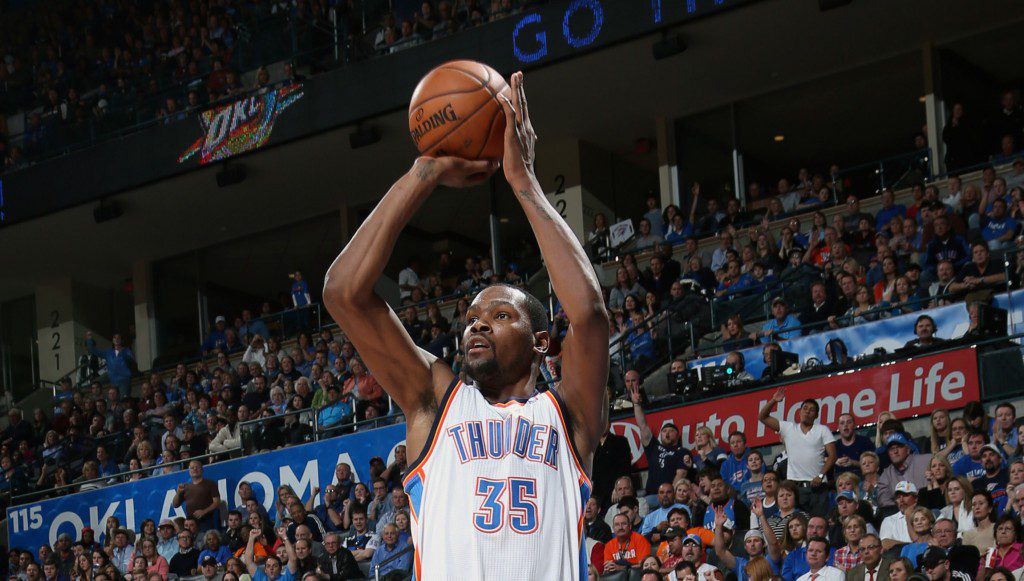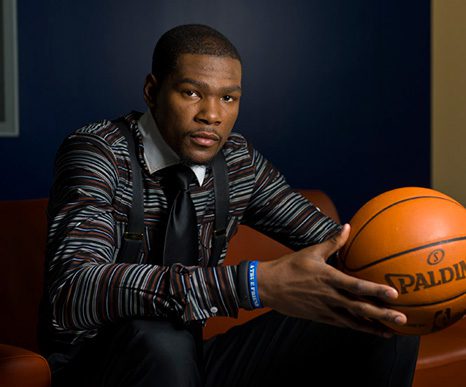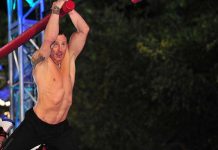
Thunder on the Horizon
That first season in Oklahoma City was another disappointing one on the surface. Durant’s prowess came through in the form of more than 25 points per game, increased rebounding and superior play on defense, even as the team struggled to win just a few more games than the previous season.
“That first year was bad,” Durant says. “But the fans were there. The fans were always excited, and they were loyal.”
Beneath the surface of the under-performing team was a nucleus of solid young talent which, led by coach Scott Brooks, was in the process of learning to play with one another.
By the next season, expectations were high for both Durant and the Thunder. Neither let fans down. Durant became the youngest scoring leader in league history and an international star, and the team stretched Kobe Bryant’s Lakers to their limit before the Thunder succumbed to a crushing 95-94 loss in the first round of the playoffs.
Durant took his game internationally in the off-season. He was the leader of Team USA in the FIBA World Championship. He led the squad to its first gold medal at this competition since 1994, averaging 22.8 points over nine games. He also signed a five-year contract extension with the Thunder.
The 2010-2011 season was even more successful as Durant once again led the NBA in scoring and led the Thunder all the way to the conference finals, losing to a gutsy Dallas Mavericks team that went on to shock the Miami Heat and win the NBA Championship.
It would be understandable if Durant – a quiet, lead-by-action-not-words superstar – recognized the pressure of high expectations for the team this year.
“No, I really don’t feel the pressure,” Durant says. “If you give your all you get good results. Not all the time. But you have to have faith that it will work out. If I mess up, I say I tried and I am working to get better.
“I’m never one to predict that we will go to the finals, or even make the playoffs,” he continues. “No doubt that anything can happen in this league. As a leader, I work hard and I try to be a great teammate. I try to always get better.”
Durant isn’t the first athlete to emphasize teamwork, hard work and dedication when addressing fans and media. But he is one of those that mean it, as demonstrated by the still short but inspiring story of his life. It is his story and his nature that have prompted Oklahoma City and fans around the state to take to him as they have no other sports figure so quickly, passionately and personally.
“A lot of people identify with humility, sincerity – Okies like that,” says the Oklahoma City Chamber’s Williams. “People see Kevin and to them, he acts the way people are supposed to act – be humble and take advantage of using your best attribute.”
Mayor Cornett points out that Durant and Oklahoma City are connected at this point.
“He is the most high-profile example anyone in the world has associated with Oklahoma City,” Cornett says. “What he does – good, bad or indifferent – reflects on our city. It’s unusual for a superstar of his stature to go through his career without an issue, but he has been a role model throughout.”
To be sure, Durant is not the only example of high character on the Thunder.
“We’ve got arguably the best character superstar in the league in Kevin Durant,” says Dean Blevins, sports director at NEWS 9 in Oklahoma City, “and Westbrook, Harden, and really, the whole team are good citizens.”
Williams agrees, saying he feels that Durant sets the bar for teammates.
“Kevin’s not an anomaly on the team,” Williams says. “I thank (Thunder general manager) Sam Presti for that. I think we’re seeing a vision of a culture he wants to create and that these are the kind of athletes they want. Long-term success comes from creating a culture in which coaches get the types of athletes they want.”
It’s a good thing that is the Thunder culture, considering the level of exposure players and staff have.
“In other communities the only time people see players is at games,” Williams says. “We see them out in the community a lot. In a community this size, you trip over them. We hear it all the time. They’re very involved. They’re so genuine, good people associated with the team. Yeah, people always put a spin on things – but that’s not the case with the Thunder. It’s not about egos.”
Kevin, From Back East
There is no sign of bloated ego in Kevin Durant as a couple of affable buddies help him prepare for a photo shoot. Does he ever get used to this kind of attention?
“It’s part of the business, everyday life,” he says. “Well, the interview part, but maybe not the makeup!”
It is when asked about his status as a role model that he quietly references his desire for people to understand he is as imperfect as the rest of us. He enjoys Oklahoma City and is deeply grateful for the support he and the team have received. His is not a Charles Barkley, “I am not a role model” stance. Instead, it is that he is just Kevin Durant, a young man from back East who worked hard to achieve his dream, and he will keep working to do his best on the court and off.
As for how he feels about being considered in the same company as Oklahoma sports legends like Wayman Tisdale, Bud Wilkinson or Sam Bradford, he bristles.
“I don’t feel like I am in that same category,” Durant says. “They have done so much for the state of Oklahoma.” He rises from his seat and heads toward the swinging door, ready to face the cameras.
Maybe not yet.


























